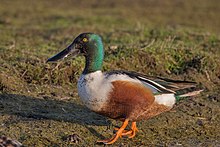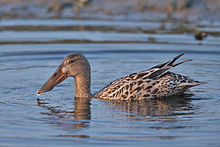Northern shoveller
| Northern shoveler | |
|---|---|
 |
|
| Male | |
 |
|
| Female | |
| Scientific classification | |
| Kingdom: | Animalia |
| Phylum: | Chordata |
| Class: | Aves |
| Order: | Anseriformes |
| Family: | Anatidae |
| Subfamily: | Anatinae |
| Genus: | Anas (disputed) |
| Species: | A. clypeata |
| Binomial name | |
|
Anas clypeata Linnaeus, 1758 |
|
 |
|
| European distribution. Summer only range All-year range Winter only range | |
| Synonyms | |
|
Spatula clypeata (but see text) |
|
Spatula clypeata (but see text)
The northern shoveler (/ˈʃʌvələr/; Anas clypeata), or northern shoveller in British English, sometimes known simply as the shoveller, is a common and widespread duck. It breeds in northern areas of Europe and Asia and across most of North America, wintering in southern Europe, Africa, the Indian subcontinent, Southeast Asia, and Central, and northern South America. It is a rare vagrant to Australia. In North America, it breeds along the southern edge of Hudson Bay and west of this body of water, and as far south as the Great Lakes west to Colorado, Nevada, and Oregon.
The Northern shoveler is one of the species to which the Agreement on the Conservation of African-Eurasian Migratory Waterbirds (AEWA) applies. The conservation status of this bird is Least Concern.
This species was described by Linnaeus in his Systema naturae in 1758 under its current scientific name. The scientific name is derived from Latin Anas "duck", and clypeata, "shield-bearing" (from clypeus, "shield"). Usually placed in Anas like most dabbling ducks, it stands well apart from such species as the mallard and together with the other shovelers and their relatives forms a "blue-winged" group that may warrant separation as genus Spatula.
...
Wikipedia

